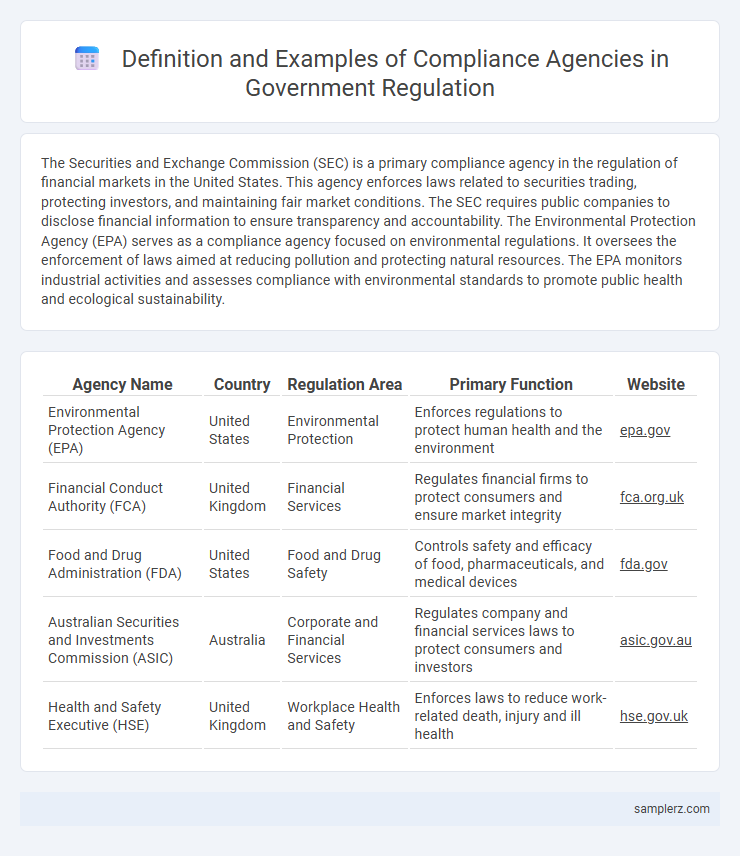The Securities and Exchange Commission (SEC) is a primary compliance agency in the regulation of financial markets in the United States. This agency enforces laws related to securities trading, protecting investors, and maintaining fair market conditions. The SEC requires public companies to disclose financial information to ensure transparency and accountability. The Environmental Protection Agency (EPA) serves as a compliance agency focused on environmental regulations. It oversees the enforcement of laws aimed at reducing pollution and protecting natural resources. The EPA monitors industrial activities and assesses compliance with environmental standards to promote public health and ecological sustainability.
Table of Comparison
| Agency Name | Country | Regulation Area | Primary Function | Website |
|---|---|---|---|---|
| Environmental Protection Agency (EPA) | United States | Environmental Protection | Enforces regulations to protect human health and the environment | epa.gov |
| Financial Conduct Authority (FCA) | United Kingdom | Financial Services | Regulates financial firms to protect consumers and ensure market integrity | fca.org.uk |
| Food and Drug Administration (FDA) | United States | Food and Drug Safety | Controls safety and efficacy of food, pharmaceuticals, and medical devices | fda.gov |
| Australian Securities and Investments Commission (ASIC) | Australia | Corporate and Financial Services | Regulates company and financial services laws to protect consumers and investors | asic.gov.au |
| Health and Safety Executive (HSE) | United Kingdom | Workplace Health and Safety | Enforces laws to reduce work-related death, injury and ill health | hse.gov.uk |
Overview of Compliance Agencies in Government Regulation
Compliance agencies such as the Securities and Exchange Commission (SEC) and the Environmental Protection Agency (EPA) play a critical role in enforcing government regulations across financial markets and environmental standards. These agencies monitor corporate practices, conduct audits, and impose penalties to ensure adherence to federal laws. Their enforcement mechanisms help maintain transparency, protect public interests, and promote legal conformity within regulated sectors.
Key Roles of Regulatory Compliance Agencies
Regulatory compliance agencies such as the Securities and Exchange Commission (SEC) and the Environmental Protection Agency (EPA) enforce laws to ensure organizations adhere to financial, environmental, and safety standards. These agencies conduct inspections, monitor compliance, and impose penalties on entities violating regulations to maintain public trust and safeguard resources. Their key roles include setting regulatory frameworks, evaluating risk management practices, and promoting transparency across industries.
Notable Federal Compliance Agencies in the U.S.
The U.S. Securities and Exchange Commission (SEC) enforces federal securities laws to protect investors and maintain fair markets. The Environmental Protection Agency (EPA) oversees regulations related to air and water quality, hazardous waste, and chemical safety. The Federal Trade Commission (FTC) addresses consumer protection, antitrust laws, and data privacy compliance across industries.
Compliance Agencies in Environmental Regulation
The Environmental Protection Agency (EPA) plays a pivotal role in enforcing compliance with environmental laws such as the Clean Air Act and the Clean Water Act. State-level agencies like the California Air Resources Board (CARB) also regulate emissions and ensure adherence to environmental standards within their jurisdictions. These agencies conduct inspections, impose penalties for violations, and collaborate with industries to promote sustainable practices.
Financial Regulation and Compliance Bodies
The Securities and Exchange Commission (SEC) is a primary regulatory agency overseeing financial markets to ensure transparency, fairness, and investor protection. The Financial Industry Regulatory Authority (FINRA) enforces compliance standards for brokerage firms and exchange markets, preventing fraud and malpractice. The Commodity Futures Trading Commission (CFTC) regulates derivatives markets, ensuring compliance with laws governing futures and options trading.
Healthcare Regulatory Compliance Agencies
Healthcare regulatory compliance agencies such as the U.S. Food and Drug Administration (FDA) enforce standards to ensure the safety and effectiveness of medical products, while the Centers for Medicare & Medicaid Services (CMS) oversees compliance with healthcare program regulations. The Office of Inspector General (OIG) conducts audits and investigations to prevent fraud and abuse in healthcare services. State-level agencies also play a critical role in monitoring healthcare providers to maintain adherence to public health laws and clinical standards.
International Examples of Compliance Authorities
The Financial Action Task Force (FATF) sets global standards for combating money laundering and terrorist financing, influencing compliance regulations worldwide. The European Securities and Markets Authority (ESMA) oversees the stability and transparency of financial markets across the European Union through stringent enforcement of securities regulations. In the Asia-Pacific region, the Australian Prudential Regulation Authority (APRA) supervises banks, insurers, and superannuation funds to ensure financial system resilience and regulatory compliance.
Compliance Agencies in Consumer Protection
The Consumer Financial Protection Bureau (CFPB) enforces federal consumer financial laws to ensure fair, transparent markets for financial products and services. The Federal Trade Commission (FTC) protects consumers by preventing deceptive and unfair business practices across various markets. State Attorneys General also play a critical role in investigating and prosecuting violations of consumer protection laws within their jurisdictions.
Challenges Faced by Regulatory Compliance Agencies
Regulatory compliance agencies such as the Securities and Exchange Commission (SEC) and the Environmental Protection Agency (EPA) face significant challenges including the rapid evolution of technology, which complicates monitoring and enforcement of regulations. Limited resources and budget constraints hinder comprehensive oversight of increasingly complex industries and markets. Furthermore, balancing stakeholder interests while ensuring transparent, fair regulation presents ongoing difficulties in maintaining public trust and regulatory effectiveness.
Future Trends in Government Compliance Agencies
Government compliance agencies like the U.S. Securities and Exchange Commission (SEC) and the Environmental Protection Agency (EPA) are increasingly integrating artificial intelligence and blockchain technology to enhance regulatory oversight and data transparency. Emerging trends include the deployment of predictive analytics for real-time risk assessment and the adoption of automated reporting systems to streamline compliance processes. These innovations aim to improve efficiency, reduce fraud, and ensure more adaptive and responsive regulatory frameworks in the future.

example of compliance agency in regulation Infographic
 samplerz.com
samplerz.com